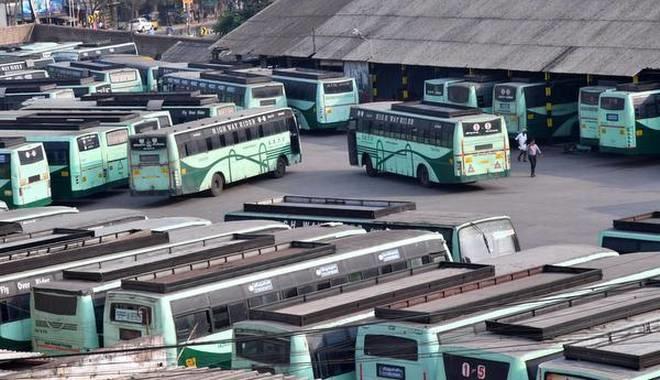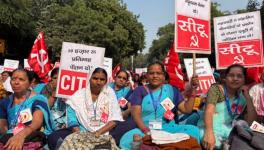Transport Workers To Observe National Strike On August 7

All India Co-ordination Committee of Road Transport Workers’Organisations has given the call for a day-long national strike on August 7 against the retrograde provisions of the Motor Vehicle (Amendment)Bill. Along with the central trade unions including CITU, AITUC, INTUC, AICCTU, HMS among others, various associations such as vehicle owners’ associations, Spare parts Dealers’Association, associations of workshop owners, etc have come up in solidarity with the pan India strike.
“The strike is to mark our protest against the retrograde provisions of the Motor Vehicle (Amendment) Bill and continuous hike in the prices of the petroleum products,” said K.K.Divakaran, national general secretary of All India Road Transport Workers’Federation (AIRTWF) which is affiliated to CITU, while speaking to Newsclick.
The much controversial Motor Vehicle (Amendment) Bill, that had already been passed in the Lok Sabha on April 10, 2017, was reintroduced in the Rajya Sabha on July 23, 2018 considering the recommendations of the select panel. As the discussion over the Bill continues, the opposition parties in the Rajya Sabha unitedly stand against the proposed amendments which will help the corporates and dilute the powers of the state governments.
READ MORE: 5 Sept Workers-Peasants Rally: Ensure Jobs for All
The unions and workers also demand that minimum wage and social security benefits should be provided to the workers in the unorganised sector. “During the 2006 national protest, the then prime minister Manmohan Singh had directed to submit a report on the issues of the workers in the transport sector. Following that,V.V. Giri National Labour Institute had submitted a final report in 2009. In the report, the government was recommended to amend the labour laws to be made applicable to each and every single worker engaged in the transport sector. But, nothing has been implemented till today, either by the earlier Congress government or the current Modi regime,” said Divakaran.
Apart from this, the 46th IndianLabour Conference held in 2015 had directed that ESI benefits should be extended to the workers in the unorganised sectors including road transport, construction, self-employed persons, rickshaw drivers along with the scheme workers. But the social security schemes for the unorganised workers have still not been made accessible to them.
Third party insurance is one of the other concerns in the transport sector. For example, while the third party insurance premium for Auto Rickshaw in April 2014 was Rs.1,212,it has gone up to Rs.2,595 in April 2018. Simply, it marked an increase of 114.10 per cent in the last four years. Not only for Auto Rickshaws, the premium is being increased for all vehicles every year. For trucks carrying weight between 12,000 tonnes to 20,000 tonnes, the third party insurance was Rs.16,360 in April 2014. ByApril 2018, it has gone up to Rs.32,367. That means, 97.80 percent has been increased in the last four years.
READ MORE: Transport Workers’ Strike: Public Transports Keep Off Roads Across The Country
“We, AIRTWF, sought a reply from the Insurance Regulatory Development Authority (IRDA) asking how the insurance premium has been increased by more than 100 percent during the past four years. However, the IRDA replied that they don’t have the details of the premium collected and payments made to the victims of accidents. Clearly, it is for the big insurance companies,” Divakaran pointed out how the BJP-led centre frames policies benefitting the corporates.
Besides, from December 29, 2016 onwards, the Ministry of Road Transport had hiked the transport department charges- license, renewal, fitness etc.- abnormally. The unions and workers have also demanded scrapping of these abnormal hikes.
As per the Bill, one of the main amendments is the introduction of the aggregator services in the transport sector. In taxi service, big corporates like Ola and Uber have absorbed a large number of taxi services. ‘If the proposed amendment is coming into existence, all the individual vehicle owners either will have to surrender to the big corporates or leave away the field. Already, the drivers who have attached their vehicles to Uber or Ola are not getting the required amount, even to pay back the bank instalments. Some drivers have committed suicide in recent times,’ AIRTWF observed.
In heavy vehicle sector also, the Centre is ‘committed to eliminating the single vehicle owners and to hand over the industry to big corporates like Ola and Uber in taxi services. Mahindra & Mahindra has already entered in the market as an aggregator. Tata too decided to enter the market as an aggregator.’
READ MORE: Are Workers’ Interests Truly Represented by the Trade Unions Amendment Act?
As the CPI(M) lawmaker Elamaram Kareem had pointed out in the Rajya Sabha on July 23rd, “by the proposed amendments, all the State Transport Undertakings in each State would come under severe financial crisis. It will lead to the closure of State Transport Undertakings and huge retrenchments.” Most of the state road transport corporations in the country which were formed by the state governments under the RTC Act 1950 are already in serious financial crisis.
“Abnormal hike in Diesel prices, Motor Vehicle Tax, Sales Tax, Excise Tax, non-enforcement of illegal operation by private operators, non reimbursement of travel concessions extended to different sections, all together have thrown the STUs in to serious and compounded financial crisis. This burden of crisis is being shifted on to the workers making them scapegoats. Wages are not being paid in time to the workers in many STUs. Terminal benefits are due for a long time. Vacancies are not filled up. Staff strength is reduced drastically and the work loads are increased.”
Along with this, third party insurance is made mandatory for the STU buses as per the proposed amendments. Practicing these Sections will lead to the closure of STUs which are already in crisis.
The unions and transport workers have been raising the issues for a while as well. So far, Tamil Nadu, Maharashtra, Rajasthan, Assam, Punjab and Telangana have witnessed massive protests and strikes by various transport workers and unions along with pan-India strike of truck owners.
READ MORE: Bihar Transport Workers Give a Strike Call on August 9, Protest Amendment to the Motor Vehicle Bill
Get the latest reports & analysis with people's perspective on Protests, movements & deep analytical videos, discussions of the current affairs in your Telegram app. Subscribe to NewsClick's Telegram channel & get Real-Time updates on stories, as they get published on our website.
























